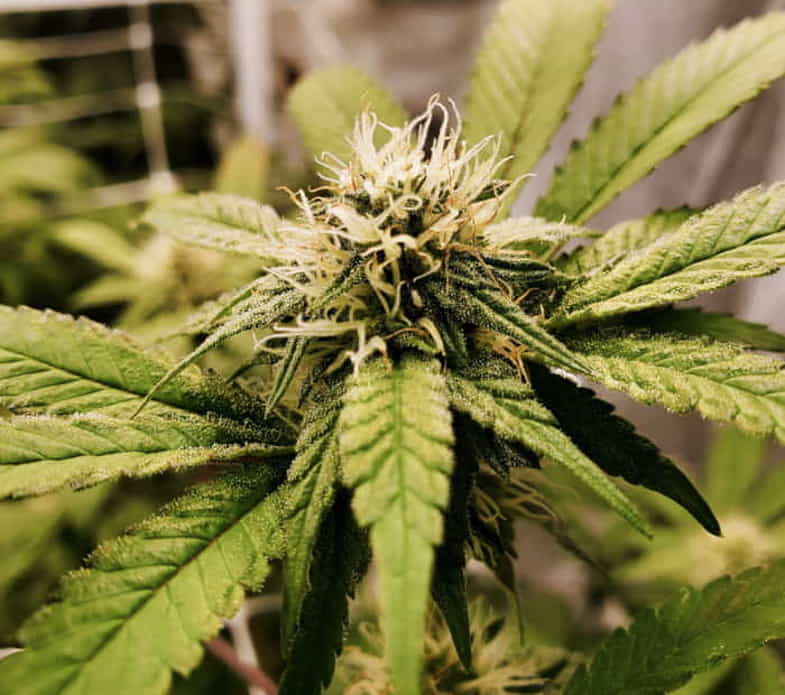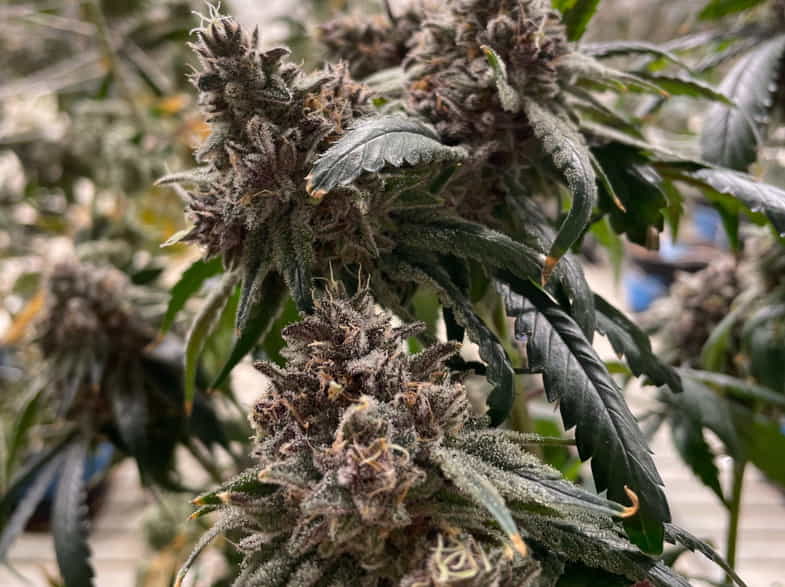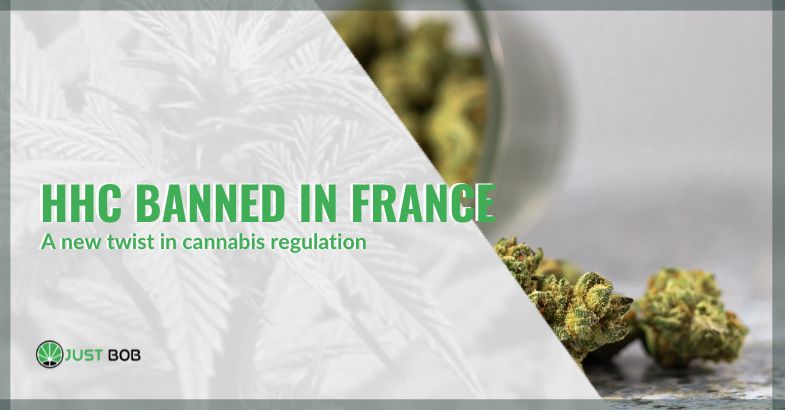Modified on: 07/04/2024
The implications of the HHC ban on public debate and the cannabis industry
The cannabis industry in France has been hit by an earthquake following the banning of HHC, a potent synthetic compound made from tetrahydrocannabinol. This event shook the market and raised a number of crucial questions about the regulation of psychoactive substances.
In the following article we will look in detail at the implications of the ban, exploring the resulting public debate and its impact on the cannabis industry.


Banning HHC production and trade: a regulatory evolution in the cannabis industry in France
HHC, or hexahydrocannabinol, is a synthetic molecule derived from THC, one of the active ingredients in cannabis.
It has a very similar structure to tetrahydrocannabinol, but with some key differences at the level of chemical bonds that give the molecule special properties, including a higher affinity for cannabinoid receptors found in the central nervous system and a lower susceptibility to enzymatic degradation in the liver.
HHC was first synthesized in the 1940s in the United States, but until recently has never been widely used as a recreational substance, unlike other synthetic cannabinoids such as K2 or Spice. Only in recent years has it been rediscovered by some legal cannabis producers and sellers, who have used it to enrich their products with a compound more potent and long-lasting than THC.
The problem is that HHC is not a natural substance, but an artificial one, and therefore does not fall under the definition of legal cannabis under French law. To be legal, in fact, light marijuana products must contain only cannabinoids naturally present in the hemp plant, such as CBD or CBG, and must have a THC concentration below the limits defined at the European and state levels.
HHC, on the other hand, is a substance of artificial origin and, as it is derived from tetrahydrocannabinol, from a certain point of view it circumvents the regulations regarding the maximum concentration of THC.
These are the reasons why it has been banned in France as of June 13, 2023, following its inclusion as a narcotic substance by the National Agency for Drug Safety (ANSM). The ban is based on the principle of precaution, as there are insufficient studies on the effects of HHC on humans and possible risks to public health.
The French authorities’ decision addresses an issue that, until now, had never been directly addressed. HHC, in fact, was not recognized as a narcotic substance by the 1961 Single Convention on Narcotic Drugs, unlike THC, which is illegal in much of the world. This allowed cannabis stores to sell inflorescences, oils and other products containing hexahydrocannabinol freely and completely legally.
Read also: Can you smoke cannabis leaves? Here’s what you need to know
The impact of the ban: uncertainties on the French market
The HHC ban had immediate consequences on the cannabis market in France, which was worth about 200 million euros in 2020. Many cannabis stores had to close or dispose of their stocks of products containing hexahydrocannabinol, losing an important source of income. Some have tried to replace HHC with other synthetic or natural and, of course, legal cannabinoids, but with uncertain results. Others are deciding to leave the cannabis sector and focus on other activities.
Reactions from industry and businesses have been mixed. Some have welcomed the HHC ban, seeing it as a necessary measure to protect consumers and regulate the cannabis market. Others criticized the French government for acting hastily and arbitrarily, without consulting experts and stakeholders. Others further denounced the HHC ban as a form of hypocrisy and repression, as it goes against the global trend toward legalization and regulation of cannabis.
The HHC ban in France is a case in point of the challenges and opportunities facing the legal hemp and legal hash industry in Europe and around the world.
On the one hand, there is a growing demand for cannabis products from consumers seeking therapeutic or recreational benefits. On the other, there is a lack of harmonization and regulatory clarity on cannabinoids, which creates confusion and uncertainty among producers, sellers, and consumers. For this reason, a constructive dialogue between competent authorities, industry stakeholders and civil society is needed to ensure the safety, quality and transparency of CBD cannabis products.
The public debate on the French authorities’ decision
Beyond the reactions of those directly involved, namely the industries and stakeholders in the legal cannabis business, the French government’s decision has also triggered a broad public debate on the role and limits of regulation of psychoactive substances. In the following paragraphs we will examine some of the main arguments for and against the HHC ban, trying to provide a balanced and critical view of the issue.
Pro-ban arguments
Supporters of the ban on HHC argue that it is a necessary measure to protect public health and social security because hexahydrocannabinol poses a serious risk to the public. Some of their reasons are as follows:
- HHC is believed to be a toxic and dangerous substance that can cause adverse effects such as anxiety, paranoia, hallucinations, tachycardia, hypertension, nausea, vomiting, convulsions and coma. In some cases, it can be fatal, especially when taken in combination with other drugs or medications;
- according to studies that have not yet been fully established, HHC is physically and psychologically addictive, causing users to seek ever higher and more frequent doses to achieve the same effects. This leads to deterioration of physical and mental health, as well as a negative impact on the personal, family, work and social life of those taking it;
- HHC would be a substance that hinders the development of effective policies for prevention, harm reduction and treatment of addiction to cannabis and other drugs. The ban is a way to send a clear and strong message to the public about the danger of psychoactive substances and the need to abstain from them or limit their use.


Arguments against the ban
Critics of the ban argue that it is an ineffective and counterproductive measure that does not solve the problem of psychoactive substance use, but rather exacerbates it. Specifically, they argue that:
- HHC is a substance that responds to a social and economic demand from cannabis users, who seek legal alternatives to THC. Prohibition does not eliminate this demand, but shifts it to other more readily available and, more importantly, illegal substances.
- HHC, like any other ‘borderline’ substance, requires rational, evidence-based regulation that takes into account the benefits and risks associated with its use. A ban would be an irrational and ideologically biased measure that ignores scientific evidence and international experience in the regulation of psychoactive substances;
- in the field of psychoactive substances, a policy of information, education and awareness of consumers and society is deemed necessary, to promote a culture of responsibility and moderation in the use of psychoactive substances through a dialogue with people. Prohibition, on the contrary, represents a decision that goes in the opposite direction from dialogue, toward prohibition, repression and stigmatization of consumers and society, which promotes a culture of fear and criminalization of part of the population.
In conclusion
The HHC ban in France has thus brought to light the complex and conflicting aspects of cannabinoid legislation. Different actors, from government to practitioners to consumers, are on different sides, often with conflicting visions.
On the one hand, authorities have opted for a cautious approach, putting public health protection and social security first. On the other hand, there are clear fears that such hasty decisions could have a negative impact on the burgeoning cannabis sector, with consequent economic repercussions.
All of this presents a critical challenge for the government, which will have to figure out how to manage the inevitable demand for cannabinoids, which will not be eliminated by simply banning a single compound. It is a challenge that highlights the importance of a well-defined and transparent regulatory framework based on rigorous scientific evidence that takes into consideration both public health and economic interests.
The HHC ban debate raises crucial questions about the regulation of psychoactive substances. There is clearly a pressing need for constructive dialogue among all stakeholders. Only then will it be possible to create a safe environment for consumers, as well as safeguard an industry that has demonstrated significant economic potential.
In the end, the situation that has arisen in France is a clear example of how policy on psychoactive substances is evolving. It will be interesting to see how this debate develops in the near future, not only in France but around the world, and what the implications will be for the cannabis industry and its consumers.
We hope you enjoyed our article and, if you are a cannabis enthusiast, we invite you to take a look at our Justbob shop. Here you will find lots of CBD products, like legal hash, CBD flowers and many more!
💡Takeaways on the HHC ban in France
- The ban on HHC has caused significant disruption in the cannabis industry in France and sparked important discussions about the regulation of psychoactive substances.
- HHC, a synthetic compound derived from tetrahydrocannabinol (THC), possesses unique properties that distinguish it from THC itself.
- In France, HHC has been banned because it is considered an artificial substance that circumvents regulations regarding the maximum THC concentration in legal cannabis products.
- The ban has had immediate consequences on the cannabis market in France, including store closures and financial losses for producers and sellers.
- The decision to ban HHC has triggered a public debate on the regulation of psychoactive substances, with arguments both in favor and against the ban, raising questions about public health protection and the promotion of effective prevention and harm reduction policies.
- HHC has been banned in France because it is considered an artificial substance that does not fit within the legal definition of cannabis according to French law.
- The ban has had a significant impact on the cannabis industry in France, leading to store closures and financial losses for many producers and sellers.
- Reactions to the ban have been mixed, with some considering it a necessary measure to protect consumers and regulate the cannabis market, while others criticize the French government for acting hastily and arbitrarily.
- The HHC ban highlights the challenges and opportunities faced by the legal hemp industry in Europe and worldwide, with growing consumer demand and a lack of harmonization and regulatory clarity on cannabinoids.
- Constructive dialogue between relevant authorities, industry stakeholders, and civil society is needed to ensure the safety, quality, and transparency of cannabis products.
- The ban on HHC has sparked a broad public debate on the role and limitations of regulating psychoactive substances.
Supporters of the ban argue that it is a necessary measure to protect public health and social security, citing potential risks associated with HHC use. - Critics of the ban argue that it is an ineffective and counterproductive measure that does not address the issue of psychoactive substance use, and may lead to the proliferation of other illegal substances.
- In the realm of psychoactive substances, there is a need for information, education, and awareness to promote responsible and moderate use through dialogue, rather than prohibition and stigmatization.
- The HHC ban in France exemplifies the evolving nature of psychoactive substance policies. It will be interesting to see how the debate unfolds not only in France but worldwide, and the implications it will have on the cannabis industry and consumers.
FAQ on the HHC ban in France
What are the implications of the HHC ban on public debate?
The HHC ban has triggered a broad public debate on the role and limits of the regulation of psychoactive substances. Supporters argue that it is a necessary measure to protect public health and social security, while critics argue that it is an ineffective and counterproductive measure that does not solve the problem of psychoactive substance use.
What are the implications of the HHC ban on the cannabis industry?
The HHC ban has had immediate consequences on the cannabis industry in France. Many cannabis stores had to close or dispose of their stocks of products containing HHC, resulting in a loss of income. The ban has also raised questions about the regulation of cannabinoids and created uncertainty among producers, sellers, and consumers.
What are the arguments for and against the HHC ban?
Supporters of the ban argue that HHC poses serious risks to public health and can be toxic and addictive. They believe the ban sends a clear message about the dangers of psychoactive substances. Critics argue that the ban is ineffective and drives users towards illegal substances. They believe in evidence-based regulation and promoting a culture of responsibility and moderation in substance use.









